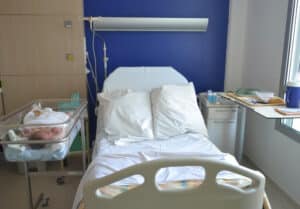Lake Charles Birth Injury Lawyers for Spina Bifida

Spina bifida is a serious birth defect that affects the spinal cord. It causes a range of debilitating symptoms and can lead to various complications. Children with spina bifida often have trouble walking and experience additional medical problems during developmental stages.
At Veron Bice, LLC, we understand the devastation of discovering that your baby has spina bifida. Treating a birth defect can be a stressful process. Many children require ongoing medical care to manage symptoms, assist with mobility issues, and improve their overall quality of life. The costs can be expensive and lead to financial strain. If you can’t afford the bills, you could face massive debt.
Our Lake Charles birth injury lawyers will advocate for your child and pursue legal action against the medical provider or facility responsible for the spina bifida diagnosis. You can count on us to fight for you and your child and seek the maximum compensation available.
Call Veron Bice, LLC for your free consultation at 337-310-1600 today.
Common Types of Spina Bifida
Spina bifida is a defect of the neural tube. The neural tube is a structure in the embryo that becomes the baby’s brain, spinal cord, and enclosing tissue as it develops. The defect causes the spinal cord and spine to form incorrectly.
The three primary types of spina bifida include:
- Spina bifida occulta (SBO) – SBO is the most common type of spina bifida, and it causes a small gap between one or more of the spinal vertebrae. Many people don’t realize they have it because it doesn’t affect the spinal nerves.
- Meningocele – Meningocele is a rare form of spina bifida. It involves a sac of spinal fluid that bulges through an opening in the back. The spinal cord isn’t in the fluid sac, and nerves are not affected.
- Myelomeningocele – The most severe form of spina bifida is myelomeningocele. This occurs when the spinal canal in the lower or middle back is open along multiple vertebrae. A sac forms on the baby’s back during birth when the spinal nerves and membranes push through the opening.
It’s vital for a doctor to examine you throughout your pregnancy. They can perform various tests to diagnose the problem if they notice any abnormalities. Early detection could ensure you begin immediate treatment and prevent your baby from suffering complications in the future.
Common Causes of Spina Bifida

The most common risk factors for spina bifida include:
- Certain medications – Certain medications, such as anti-seizure drugs, can cause defects in the neural tube if a woman takes them while she is pregnant. Experts believe these drugs interfere with the body’s ability to use folic and folate acid.
- Genetics – A neural tube defect is more likely in a newborn if a couple already has a child with the defect. The risk significantly increases if they have two children with a neural tube defect. Additionally, the likelihood of a baby developing spina bifida is higher if the mother has a neural tube defect.
- Obesity – Neural tube defects, including spina bifida, are more likely when a woman is obese before getting pregnant.
- Folate deficiency – Folate is essential to a baby’s development. A deficiency in folic acid increases the risk of a child developing spina bifida.
- Increased body temperature – Some studies show a slightly higher risk of a neural defect when a woman suffers hyperthermia during the early stages of pregnancy.
- Diabetes – Diabetic women who can’t control their blood sugar adequately might have an increased chance of giving birth to a baby that develops spina bifida.
You should discuss any risk factors you may have with your medical team. They can monitor you closely during pregnancy and create a plan to keep your baby healthy and safe.
Diagnosing Spina Bifida
Treating spina bifida requires an accurate diagnosis. Doctors can run various prenatal screening checks to look for signs of the birth defect. Common tests medical providers use include:
- Blood tests – A blood test can check the levels of a protein the baby produces called alpha-fetoprotein. Unusually high levels can indicate a neural tube defect, such as spina bifida.
- Ultrasound – A fetal ultrasound is the most accurate diagnostic tool. It can detect signs of spina bifida, such as an open spine.
- Amniocentesis – The doctor might recommend amniocentesis if the ultrasound confirms a spina bifida diagnosis. The doctor will use a needle to remove a fluid sample from the amniotic sac and test it.
How to Treat Spina Bifida
The type of spina bifida treatment your child needs will depend on the type and severity of the defect. Spina bifida occulta typically doesn’t require medical intervention because it doesn’t cause symptoms. However, other types can be painful and lead to complications without proper medical care.
Fetal Surgery
A baby with spina bifida can experience worsening nerve function after birth. Without treatment, various issues can arise, including disability.
A doctor could perform prenatal surgery before the 26th week of gestation. The surgeon opens the uterus during the procedure to repair the damage to the unborn baby’s spinal cord. Using a fetoscope is a less invasive option for patients who are good candidates for the procedure.
Some studies show fetal surgery to treat spina bifida can improve mobility and the chance that the child can walk without crutches or another assistive device. Surgery might also reduce a child’s risk of developing hydrocephalus. Hydrocephalus is an accumulation of fluid in the ventricles within the brain.
Cesarean Section
A cesarean section is often necessary when an unborn baby has myelomeningocele because they are breech during delivery. A breech position makes childbirth more complicated. It can lead to various complications and other types of birth injuries.
Surgery After Birth
Closing the opening in the newborn’s back within 72 hours of birth is necessary if they have myelomeningocele. The surgery could mitigate the risk of infections caused by the exposed nerves in the back. It can also prevent additional trauma to the spinal cord.
A neurosurgeon can position the exposed tissue and spinal cord back inside and cover them with the baby’s skin and muscle.
Treating Complications of Spina Bifida
Some types of spina bifida can cause complications before childbirth. The baby might already have medical conditions that need treatment starting at a young age.
The type of complication and severity of spina bifida will determine the available treatment options. The most common include:
- Surgery to treat hydrocephalus – If the baby has hydrocephalus, a surgeon can place a tube that drains fluid from the brain into the abdomen. Myelomeningocele commonly leads to this type of complication. A doctor can position the tube either while performing surgery to close the sac on the spine, immediately after delivery, or when fluid accumulates. An endoscopic third ventriculostomy is a less invasive option for candidates that meet the necessary criteria.
- Bladder and bowel management – You could reduce the risk of illness and organ damage with routine bladder and bowel evaluations. Evaluations include ultrasounds, bladder function studies, blood tests, and X-rays. Managing bladder issues might require surgery, catheters, and medications. You can manage bowel problems with enemas, oral medications, suppositories, or a combination of these methods.
- Walking and mobility aids – You can start your baby on an exercise regimen early to prepare their legs for using crutches when they’re older or walking with braces. Some kids eventually need to use a wheelchair or walker. Physical therapy and mobility aids can help the child be self-sufficient and independent as they grow.
- Additional treatment – Other types of treatment are available for gastrointestinal problems, orthopedic complications, skin disorders, and tethered spinal cord. For many complications of spina bifida, treatment can alleviate or reduce symptoms and improve quality of life.
Compensation for Spina Bifida
You could pursue a medical malpractice case if a medical error caused your baby’s spina bifida. The medical facility or a specific doctor might be at fault for the birth injury. You could file a claim with their insurance company or file a lawsuit directly against them.
The compensation you receive might cover losses, such as:
- Lost wages
- Lost earning capacity
- Medical bills
- Pain and suffering
- Long-term disability
- Mental anguish
- Loss of enjoyment of life
You have limited time to sue someone for your baby’s spina bifida in Louisiana. The statute of limitations allows a one-year timeframe to file your lawsuit. That means you must initiate your lawsuit within one year from the date of your child’s injury to seek compensation.
You might not realize your doctor made an error that harmed your child. If you don’t discover medical malpractice occurred until later, you have one year from the date you discovered or should have reasonably discovered the birth injury to file your lawsuit.
Contact Us
Veron Bice, LLC has decades of experience representing parents in medical malpractice claims. You should have a chance to hold the at-fault doctor liable for your baby’s spina bifida diagnosis. We will provide legal guidance during this challenging ordeal and help you fight for the justice you deserve.
If your baby developed spina bifida due to a healthcare professional’s improper conduct, call Veron Bice, LLC at 337-310-1600 for your free consultation with one of our Lake Charles birth injury lawyers.









